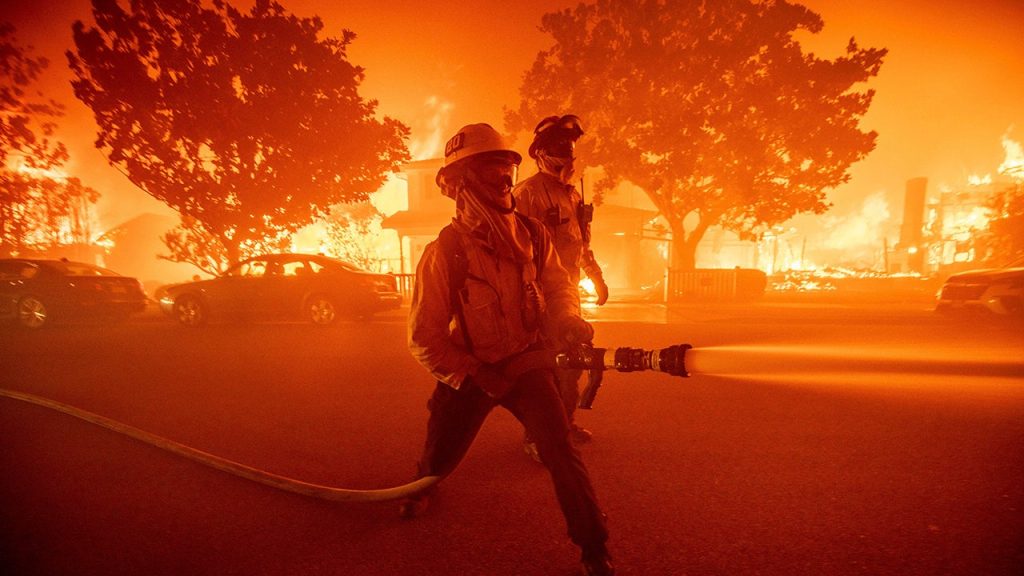The raging wildfires currently engulfing Southern California have necessitated extreme measures, including the rare and often contentious practice of utilizing seawater to combat the flames. This desperate tactic, while potentially damaging to equipment, infrastructure, and the environment, becomes a necessary evil when conventional firefighting methods are insufficient to contain the rapidly spreading blazes. The justification, as explained by fire safety expert Frank Papalia, lies in the stark choice between potential long-term damage and the immediate threat to life and property. Much like moving an injured person from a dangerous environment despite the risk of exacerbating their injuries, using saltwater becomes a calculated risk to prevent even greater devastation.
The primary method of deploying seawater involves aerial drops from planes and helicopters, scooping water from the ocean and dumping it onto the inferno. This method, already in practice in Southern California, offers a rapid response capability, delivering large volumes of water to hard-to-reach areas. However, this approach is not without its challenges. Aircraft availability, flight range, and carrying capacity limit the effectiveness of aerial drops. Furthermore, adverse weather conditions, such as strong winds, can ground aircraft, rendering this method unusable. A recent incident involving a drone colliding with a firefighting plane highlights another vulnerability of this approach, emphasizing the critical need for a safe operating environment free from interference. The ensuing investigation underscores the severe consequences of such reckless actions, which not only hamper firefighting efforts but also pose a significant safety risk.
While the use of saltwater in firefighting is often viewed as a last resort due to its corrosive nature and potential harm to the environment, its application becomes justifiable when balanced against the catastrophic consequences of uncontrolled wildfires. The devastation caused by these fires justifies the temporary compromise, prioritizing the immediate preservation of life and property over the long-term implications of saltwater use. While acknowledging the potential negative impacts, the dire circumstances dictate a pragmatic approach where the lesser of two evils prevails. The sheer scale of the destruction, threatening entire communities, necessitates prioritizing the immediate containment of the fire over the potential long-term effects of saltwater exposure.
The current firefighting infrastructure, primarily reliant on freshwater hydrants, is not designed for saltwater use. Integrating saltwater into the existing system would necessitate significant and costly overhauls, including replacing non-corrosion-resistant pipes and establishing separate saltwater pumping stations. The economic burden of such a conversion would be prohibitive, especially considering the sporadic nature of such extreme firefighting needs. Furthermore, the reliance on pressure within the hydrant system presents another challenge. Multiple hydrants operating simultaneously result in pressure loss, impacting the effectiveness of firefighting efforts. This limitation underscores the crucial role of strategic water management during large-scale fire incidents.
Firetrucks themselves possess the capability to utilize saltwater, provided they are in close proximity to a source and undergo thorough cleaning afterward. This approach, feasible in locations like coastal airports, faces practical limitations in more challenging terrains like beaches where access for firetrucks is restricted. The logistic hurdles of maneuvering heavy equipment on sandy beaches present significant challenges, hindering the effective deployment of this tactic. This example highlights the importance of considering terrain and accessibility when devising firefighting strategies, emphasizing the need for adaptable and context-specific solutions.
The escalating severity of the Southern California wildfires paints a grim picture. With a mounting death toll and hundreds of thousands displaced from their homes, the situation continues to deteriorate. The mobilization of thousands of firefighters and support personnel from California and neighboring states underscores the magnitude of the disaster. The dire prediction by experts that these fires could rank among the worst in history further emphasizes the gravity of the situation. The widespread devastation, human suffering, and unprecedented mobilization of resources paint a stark portrait of a crisis of epic proportions, highlighting the urgent need for effective and innovative firefighting strategies.










